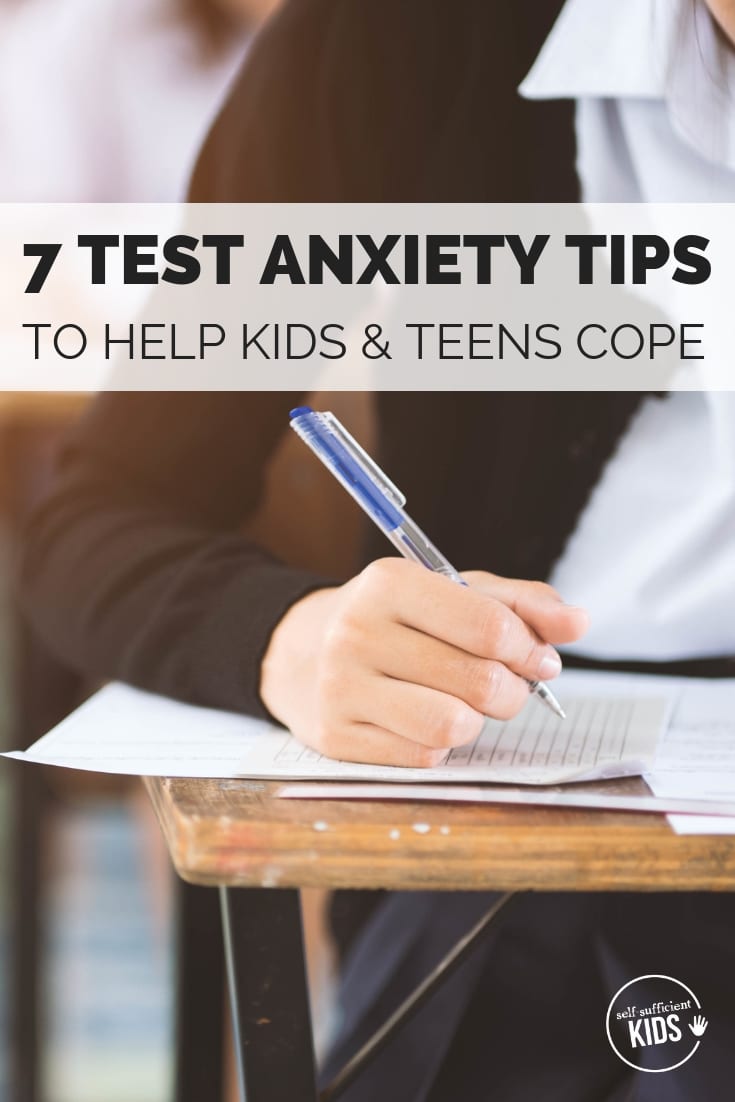7 Test Anxiety Tips to Help Kids and Teens Cope With Test-Taking Nerves
Kids of all ages can experience test anxiety. Here are seven test anxiety tips to help your child cope with the unease of taking a timed test.

(This post contains affiliate links. If you click on a link and purchase the item, I will receive a commission at no extra cost to you.)
It’s a classic nightmare: you’re sitting at your desk, about to take an exam, and it dawns on you that you completely forgot to study. There’s a reason this dream still rattles many of us long past our years in the classroom. It’s rooted in an often anxiety-laden childhood rite of passage: the standardized test.
Both of my children have taken standardized tests at their elementary school, and until recently, I hadn’t noticed any problems around testing week. Then one afternoon earlier this year, my nine-year-old suddenly burst into tears in the middle of unpacking her school bag. “Tomorrow is testing,” she sobbed, “and I know I’m going to do horribly!”
Her worries felt frustratingly familiar. I was the definition of a nervous wreck during my school’s testing days, managing to convince my mother on a few occasions that I was too sick to attend classes.
My daughter and I aren’t alone. The American Test Anxieties Association estimates that roughly one-third of students experience either moderate or high test anxiety, or feelings of distress before or during an exam. These worries aren’t limited to older students taking high-stakes exams like the SAT or ACT; some children in first and second grade are already showing evidence of test anxiety.
To identify some strategies to help my daughter, I reached out to Eva Igler, who counsels children under the supervision of licensed psychologists at the Child Stress and Coping Lab at the University of Wisconsin-Milwaukee. Igler notes that “anxiety in younger children, especially those in elementary school, can look quite different from how we traditionally think of anxiety in adults.”
While test anxiety can manifest itself in telltale physical symptoms like stomachaches and difficulty sleeping, children may also appear defiant, irritable, or willful. Some might display emotional lability, or rapid, exaggerated mood changes, from calm to extremely upset – similar to my daughter’s sudden meltdown after school.
How can we empower our kids to cope better with test anxiety? Here are a few tips to consider.

First, identify how test anxiety affects your child
Are there physical symptoms, emotional, or both? If you know, for example, that your child always experiences stomachaches on test morning, you can plan to respond appropriately – not by letting him or her stay home and in bed – but by offering some anxiety-coping strategies. Similarly, if you tend to notice increased bouts of crying or moodiness during test week, you can respond by addressing test anxiety as the root cause.
Encourage your child to practice anxiety-reduction techniques regularly
Strategies like deep breathing and progressive muscle relaxation are helpful, but for maximum effectiveness, kids should practice these exercises when not feeling anxious. It’s important to practice on a regular basis, explains Igler, so that children can easily call upon these tools during the really stressful moments.
For guided exercises, Igler recommends YouTube (try a search for “mindfulness for kids”) as well as the Headspace app, which offers age-appropriate meditation exercises.

Model coping skills
We all experience anxiety. If parents successfully model coping skills, kids will learn by example, says Igler. This means we allow our children to see when we’re feeling anxious and verbalize how we’ll manage the situation.
For example, imagine you and your kids are stuck in traffic on the way to an appointment. You might say, “I’m feeling anxious that we’ll be late because of traffic.” Talk your kids through how you will cope with the momentary distress – can you do some deep breathing or choose some fun music to listen to together? – then show them. This strategy also enables our children to learn empathy by helping them see that adults experience anxiety and worry too.
Use physical activity to channel nervous energy
While meditation and deep breathing help lower anxiety, physical activity harnesses those nerves. Abby Collier, a mom in Wisconsin whose son experiences severe test anxiety, notes that exercise is one of her family’s coping strategies. “On days when we think my son will be anxious about school, we go for a long dog walk in the morning,” she says.
When test day is looming, get outside into nature for a family walk or a bike ride. If it’s cold or rainy, turn up the music at home and have an impromptu dance party.
Be mindful of how you discuss standardized testing
Schools often emphasize that students be well-rested and eat a good breakfast on test day. This advice, while sound, can signal the test’s importance and increase performance anxiety.
To counter this effect during testing week, I now encourage my daughter to give her best effort but remind her that preparing for test day is no different than getting ready for a regular school day. Collier coaches her son to think about the test as a snapshot of how he is doing on that one day, rather than as a permanent measure of ability or potential. “We talk about testing as just one part of our performance at school,” she explains, “with effort, honesty, and kindness being more important.”
Talk with your child about the other ways he or she shows effort at school. Emphasize that the tests are a tool for teachers and schools in making the learning experience better for everyone.
Allow your kids to experience anxiety, and express confidence in their ability to cope
It’s normal for us to want to protect our kids from upsetting or frightening situations. While it feels uncomfortable to know our kids may experience anxiety, delaying – or worse, allowing them to forgo – a stressful situation will magnify its fear factor in their minds.
Letting our kids muddle through a tough experience, while supporting them through it, shows them we believe they’re capable and strong and helps them learn self-efficacy. Think of this as a kinder, gentler version of the “Suck it up, kid!” approach. Remind your child that he or she has gotten through tough experiences before and can manage this, too.
Decades ago, my mother wisely employed just this strategy. After a few rounds of my mysterious test week affliction, my mom pulled me out of bed, drove me to school, and told me, not unkindly, that she understood I didn’t love testing, but this was a part of life and I needed to just deal with it. Then she gave me a hug and kiss and drove away, leaving me to battle my evil Scantron sheets.
Looking back, I wonder how my mom was feeling in those moments after she dropped me off. Was she worried about me, uncertain about how I’d cope in my heightened emotional state?
Maybe.
But she never displayed a hint of unease, and the confidence she showed at that critical moment made a lasting impact on me. Even though my stomach was in knots, I managed to complete my test that day, and the next ones after that. When I realized I’d made it through without fainting or otherwise embarrassing myself, I felt almost giddy. My test anxiety decreased significantly after that.
Coping with something difficult, notes Igler, “doesn’t mean acing the test or getting first place. It means simply getting through it, no matter how rocky, despite feeling anxious.”
After the test, celebrate together in a way that feels special to your child. Go out for ice cream, watch a movie, or cook a favorite meal.
Consider therapy and other resources when appropriate
“Therapy is a gift,” says Igler. “If you think that your child could benefit, even if you don’t necessarily know how, start your search for a therapist sooner rather than later.” Therapy for kids often involves the entire family. Contrary to popular opinion, it’s not just sitting on a couch and talking; it can involve playing games and making up stories.
Igler also recommends the book, You and Your Anxious Child: Free Your Child from Fears and Worries and Create a Joyful Family Life, by Anne Marie Albano, PhD.
There’s a silver lining for kids who struggle with test anxiety: research indicates that students who learn to better manage test anxiety may cope more effectively with other types of anxiety.
Standardized tests may be inevitable, but with the development of coping skills and resilience, the anxiety surrounding them does not have to be.

Gina Rich is a writer and mother of two daughters. She shares caffeinated ramblings about motherhood, grief and loss, and mental health on her blog at Love and Hope and Coffee. You can also find her on Instagram at lovehopeandcoffee.
You may also like:
To Raise Emotionally Intelligent Children, Stop Being Perfect and Start Being Real
A Gentle, Empowering Approach to Handling Children’s Separation Anxiety
How to Empower Boys to Express Their Emotions Freely
What to do next…
1. Subscribe to Self-Sufficient Kids’ email list.
Like what you read here and want to learn more? Every Thursday I’ll send you one parenting tip about raising self-sufficient kids and creating the peaceful relationship you yearn to have with your child. Click here to sign up.
2. Take one of my quizzes!
Find out if you’re raising a self-sufficient kid (click here) or if you’re doing too much for your kids (click here). At the end of each quiz, you’ll be asked to provide your email address to see the results.
3. Get your kids started on chores.
Learn how to get your child started on chores (& keep them motivated + avoid power struggles) by enrolling in my Get Your Kids Successfully Started on Chores course. Click here to learn more and sign up.

